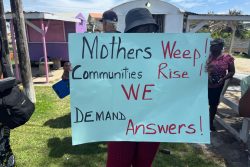Observers of the political and economic scene in Barbados will recognize increasing anxiety about the economic state of the nation, when viewed in the context of the government’s prospects in elections due next year (they were last held in January 2008). It is obvious that both of the main political parties – the ruling Democratic Labour Party and the Barbados Labour Party, once again led by former Prime Minister Owen Arthur – are readying themselves for the election fight. But there are also intimations that in what has been a difficult economic situation since about 2008-09, both government and opposition are well aware that they face an electorate which has to be persuaded that one can do any better than the other.
The fact of the matter is that the main sectors of the economy, and particularly the major tourism and international financial services sectors have suffered substantially over the years, with tourism in particular having experienced major declines in arrivals, and consequent closures of hotels as well as guest houses, which are an important component of the industry there. Standards and Poors, now as much a bogey to Caribbean governments as the IMF has been for many years, has recently given junk status to the country’s credit rating, raising the ire of the Governor of the Central Bank, who has also been harshly critical of the IMF’s recommendations for fiscal consolidation – meaning in effect a reduction of public expenditure, with the publicly-feared consequence of public sector employment reductions.
This perception of possible continuing economic difficulty is one difficult to accept by a population which is highly rated in terms of indices of human development, and in terms of a public sector which plays a significant part in employment.
In that context, something that is usually avoided in Barbados – continuing public criticism of the Central Bank and its Governor – has now become a focus of the political arena, in a country that usually prides itself on the independence of its public service. In a speech last weekend, the Governor himself appeared to be contradicting a fiscal consolidation plan which the government seems to have agreed with the Inter American Development Bank, and which is assumed not to be too different from the IMF’s orientation. And this has inevitably given room for opposition criticism that the government would appear to be facing in two directions at the same time.
A further shadow casting gloom over the country’s perception of its future is what has appeared to be a continuing reluctance on the part of the Freundel Stuart government to deal with the implications of the CLICO-British American Insurance Company (BAICO) collapses, that have created trauma among the large middle class of the country. The government has seemed to be conflicted by widespread public perceptions that its leadership had strong connections with the CLICO leadership, and has been virtually paralysed on the issue since the death of former Prime Minister David Thompson, recognized as more dynamic than Freundel Stuart. Thompson himself had replaced Clyde Mascoll, who, now as BLP spokesperson on the economy, has been a thorn in the flesh of his former DLP colleague Stuart.
On the other hand, the leadership of the Barbados Labour Party seems to have now shaken off what can be described as Owen Arthur’s substantial defeat in 2008, and the trauma that it created for them. With his return to the helm of the party, it is seeking to provide the electorate with a perception that the BLP has new policies to face the current recession, and that his party, divided by his removal of Mia Mottley from its leadership, has now found a degree of unity such that it can be trusted to govern again.
A recent poll by a leading Barbados firm, CADRES, has reinforced Arthur’s view of his prospects. It has placed him well ahead of Prime Minister Stuart in terms of popular perceptions of capability for leadership, and placed the BLP ahead of the DLP in terms of the coming general elections. In addition the poll has indicated that the Minister of Finance, Chris Sinckler, is in fact more popular than his leader – a situation no doubt felt by Sinkler for some time, given intimations within the party that the PM should retire gracefully.
The region will no doubt be watching the next few months in Barbados with much interest. There are some perceptions that since the re-election of the DLP, Barbados has assumed a harder policy line on the admission of other Caricom nationals to the country. The control of immigration was in fact an aspect of the DLP election campaign led by David Thompson, and a perception of hostility has been highlighted by a much publicized case of alleged maltreatment of a Jamaican national that has attracted the concern of the highest political levels in that country. What would appear to the man in the street as the dragging out of the judicial process on this matter, has not helped regional perceptions of the government’s general approach to Caricom immigration.
In addition, there is some degree of feeling in the Region as a whole, that since the DLP’s assumption of office, the apparent enthusiasm indicated by Owen Arthur as lead Prime Minister for the implementation of the Single Market and Economy seems to have waned. But it is probably the case that the present government of Barbados takes the view that there would appear to be little enthusiasm among other regional governments for the matter, and that Barbados can go only as far as its Caricom colleagues wish to go.
It is certainly the case also that Guyana and the OECS states will be anxious to see progressive movement on the CLICO-BAICO issue by whichever government is victorious at the polls.
But what appears to be going to have the strongest influence on the Barbadian electorate in the coming elections will probably be their increasing concern with the future directions of the international economy, and in particular, the policies of the countries of Europe and the United States which remain the bedrock of its tourism industry, the focus of its attempts to maintain a viable international services sector as the economy’s second leg, and the continued economic well-being of the substantial middle class that exists there.









